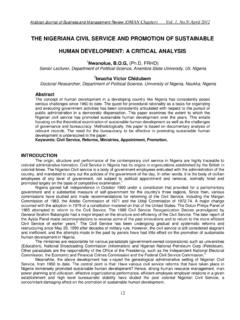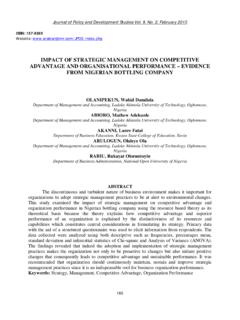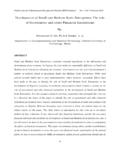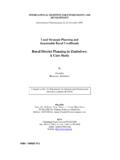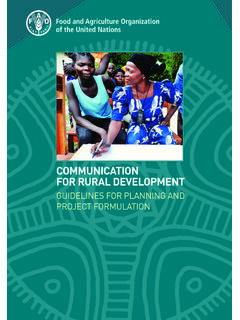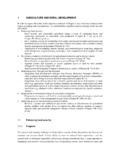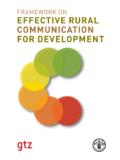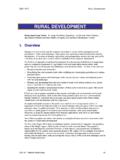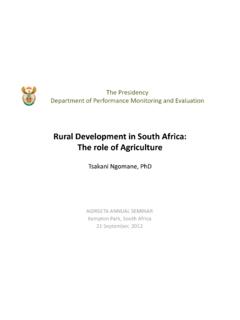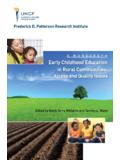Transcription of RURAL AND COMMUNITY DEVELOPMENT IN NIGERIA: AN …
1 , 20142 Arabian Journal of Business and Management Review (Nigerian Chapter) Vol. 2, No. 17 RURAL AND COMMUNITY DEVELOPMENT IN nigeria : an assessment ENYI JOHN EGBE, Department Of Political Science, Benue State University, Makurdi Abstract The paper examines RURAL or COMMUNITY DEVELOPMENT in nigeria with emphasis on the institutions, agencies, policies and strategies employed to bring about the much needed RURAL DEVELOPMENT in the country. It goes further to assess the impacts of the various efforts made by both the domestic and foreign governments and international organizations, institutions, agencies and non-governmental organizations to bring about real DEVELOPMENT at the grassroots level.
2 In the attempt to do this, clarification of concepts like DEVELOPMENT , RURAL areas, and RURAL DEVELOPMENT was carried out, which formed the theoretical basis of the analysis. It was found out that efforts made by the Nigerian government though several strategies like the nation s DEVELOPMENT plans from colonial era to date which were ex-rayed did not bring about meaningful DEVELOPMENT . Similarly international organizations and regional strategies have not lead to any significant improvement in the living conditions of the RURAL dwellers and RURAL DEVELOPMENT in general. It was also found out that a number of issues such as corruption and mismanagement, faulty planning from above rather than bottom-up approach; pursuance of the colonial and neo-colonial economic and social policies which were anti people among other factors led to failure of the RURAL DEVELOPMENT efforts.
3 The paper therefore concludes among other things that for rapid and sustained RURAL DEVELOPMENT to take place, the lopsided and urban based DEVELOPMENT process must be reversed to RURAL -based and bottom-up approach, government to continue to create conducive environment for RURAL DEVELOPMENT to thrive, change of attitudes and orientation by all and sundry, particularly the leadership class in nigeria in order to minimize corruption and mismanagement of resources. Therefore, for RURAL DEVELOPMENT to be realistic and enduring, these measures should be given priority attention, especially at the implementation stages. 1. INTRODUCTION nigeria gained independence in 1960 from the British colonial government.
4 Ever since then, RURAL or COMMUNITY DEVELOPMENT has been declared a priority by the successive governments, be it civilian or military. In this regard, several organizations, institutions and agencies have been set up to undertake and monitor the complicated process of nation-building, DEVELOPMENT and integration. This post colonial orientation is a deviation from the erstwhile colonial arrangement whereby DEVELOPMENT efforts in all spheres were concentrated in the urban areas to the neglect of RURAL areas. Hence, projects such as the construction of roads, bridges, schools, railway lines, air trip, ports and marketing boards, among others, were all aimed at opening the RURAL areas as a link for the easy exploitation of export raw materials.
5 However, the declared objectives and policy statements of various governments in nigeria have been mere rhetoric and smoke-screens intended not only to diffuse criticisms but to hide what the whole thing has been a systematic exploitation and dehumanization of the RURAL dwellers. In spite of this criticism, there is no doubt that the Nigerian government and its leaders , 20142 Arabian Journal of Business and Management Review (Nigerian Chapter) Vol. 2, No. 18 have not only recognized the fact of the important roles which the RURAL sector plays in the generation of national wealth but also that over 70% of Nigerians live in RURAL areas. It is to be noted that nigeria is not alone in the recognition of these facts.
6 Leaders of the developing countries in Africa have also come to accept the DEVELOPMENT of RURAL areas as a sine qua non for national DEVELOPMENT . In nigeria , over the years the stated objectives and strategies of RURAL and COMMUNITY DEVELOPMENT have been pronounced by policy makers and those concerned with the issue of DEVELOPMENT . But there still exist enormous gap between policy formulation and implementation and the reality of the level of the DEVELOPMENT of the RURAL populace. For example, several approaches in terms of RURAL DEVELOPMENT planning and execution have been adopted. Some of these included the creation of states, local government areas, mobilization of people for local participation in planning and implementation of COMMUNITY DEVELOPMENT projects in order to create new centres of DEVELOPMENT , and thus stem the drift from RURAL to urban areas.
7 A look at the National DEVELOPMENT plans of nigeria from 1975-1985 and other RURAL DEVELOPMENT programmes like Operation Feed the Nation (OFN), Green Revolution, River Basin DEVELOPMENT Authorities, Agricultural DEVELOPMENT Projects and many others have emphasized the need to tackle the problem of RURAL under- DEVELOPMENT . On the part of government therefore there is the realization that there is need to bring the neglected RURAL areas into the mainstream of national DEVELOPMENT . The thrust of this paper therefore is to examine the pattern of RURAL and COMMUNITY DEVELOPMENT in nigeria , especially in those areas which have the greatest impact on the lives of RURAL dwellers. We intend to establish that the pattern of DEVELOPMENT of the RURAL areas was not meant to improve the lives of the RURAL dwellers.
8 On the contrary, this process has been geared towards their exploitation and impoverishment despite their enormous contribution to national wealth and the fact that over 70% of Nigerians live in the country-side. It is further argued that the bane of nigeria s DEVELOPMENT process is the neo-colonial, dependent economic system operating in the country. This system breeds mass poverty and deprivation, social unrest and political instability like the types nigeria is facing today-uprising of Boko Haram, ethnic militia, armed robberies, and kidnappings, among others. The rest of the paper will be dedicated to conceptual clarification, theoretical basis of the work, in dept analysis of the strategies and efforts towards RURAL and COMMUNITY DEVELOPMENT in nigeria , and the assessment of these efforts, and finally recommendations and conclusion.
9 2. CONCEPTUAL ISSUES. The following key concept will be defined in this work. They are DEVELOPMENT , RURAL areas, and RURAL or COMMUNITY DEVELOPMENT . DEVELOPMENT The concept of DEVELOPMENT is very difficult to define because it is value loaded. It is often equated with economic growth or economic DEVELOPMENT . Indeed the two concepts are often used interchangeably, but they do not mean the same thing. Economic DEVELOPMENT is an essential component of DEVELOPMENT , yet it is not the only one. There are many other aspects of DEVELOPMENT . According to Rodney (1972:9), he defines DEVELOPMENT as: a many-side process. At the level of the individuals, it implies increased skills and capacity, greater freedom, creativity, self-discipline, responsibility and material well being.
10 On the other hand Todaro (1977:96-98) says that: , 20142 Arabian Journal of Business and Management Review (Nigerian Chapter) Vol. 2, No. 19 DEVELOPMENT must therefore be conceived as a multi-dimensional process involving changes in structure, attitudes and institutions, as well as the acceleration of economic growth, the reduction of inequality and the eradication of absolute poverty. In essence, DEVELOPMENT must represent the entire gamut of changes by which the entire social system, turned to the diverse basic needs and desires of individuals and social groups within the system moves away from the conditions of life regarded as materially and spiritually better . This means that DEVELOPMENT involves the reorganization and reorientation of the entire economic and social system.
